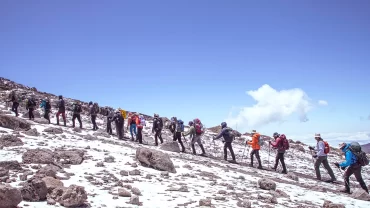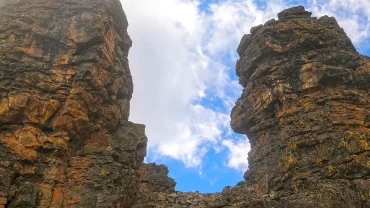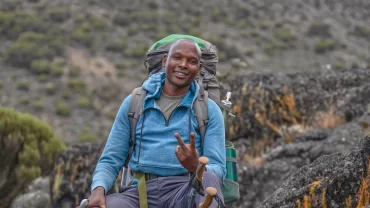Mount Kilimanjaro, Africa’s highest peak, is a dream destination for adventure seekers. However, a successful climb requires careful planning, physical preparation, and post-climb recovery. Following a structured Kilimanjaro climb preparation timeline ensures a safer and more enjoyable experience. Here’s a step-by-step guide to preparing for your climb and celebrating your success.
8–12 Weeks Before the Climb: Building Fitness & Stamina
The foundation of any successful Kilimanjaro trek is physical preparation. In this phase of your Kilimanjaro climb preparation, focus on:
- Endurance training: Engage in regular cardio exercises such as walking for at least 4 hours, running, or cycling and also swimming. Those are good for stamina.
- Strength training: Work on leg muscles, core stability, and overall body endurance.
- Walking practice: Carry a weighted backpack on practice hikes to simulate trek conditions.
- Altitude acclimatization: If possible, train at high altitudes to prepare for lower oxygen levels.
4–8 Weeks Before the Climb: Gathering Gear & Medical Prep
This period is crucial for assembling the right gear and taking health precautions to ensure a smooth Kilimanjaro climb preparation process.
- Gear checklist: Invest in high-quality hiking boots, layered clothing, trekking poles, and a reliable backpack.
- Break-in gear: Wear your boots and test all equipment on local hikes.
- Medical check-up: Visit your doctor to discuss vaccinations, altitude sickness medications, and general health readiness.
- Hydration and diet: Start drinking more water daily and eating balanced meals rich in carbohydrates and proteins.
2–4 Weeks Before the Climb: Final Adjustments & Logistics
With just weeks to go, this phase of your Kilimanjaro climb preparation involves fine-tuning your logistics and finalizing trip details.
- Confirm travel plans: Ensure your flight, accommodations, and trekking company bookings are in order.
- Itinerary review: Familiarize yourself with your route, expected weather conditions, and daily trekking schedule.
- Altitude acclimatization: If possible, spend time at higher elevations before your trip.
- Gear test: Do a full gear check and pack everything properly, best to follow the provided parking list.
1 Week Before the Climb: Mental & Physical Readiness
As the climb approaches, staying physically and mentally prepared is crucial for a smooth Kilimanjaro climb preparation experience.
- Stay hydrated: Continue drinking plenty of water.
- Eat well: Focus on nutrient-dense foods to fuel your body.
- Rest adequately: Get plenty of sleep and avoid last-minute intense workouts.
- Pack strategically: Organize your gear systematically for easy access during the trek.
During the Climb: Daily Routine & Summit Preparation
Your Kilimanjaro climb preparation doesn’t end when you start trekking—it continues throughout the journey.
- Follow the “pole pole” approach: Trek at a slow, steady pace to adjust to altitude.
- Stay hydrated and eat well: Fuel your body with high-energy foods and plenty of water.
- Listen to your guides: They are experienced and will provide essential support and safety tips.
- Summit night strategy: The final ascent is tough; prepare mentally for the challenge and celebrate each milestone.
Post-Climb: Recovery & Celebration
After completing the climb, allow your body time to recover. This is an essential phase of Kilimanjaro climb preparation, even after descent.
- Rest and rehydrate: Restore lost fluids and give your muscles time to heal.
- Stretch and relax: Light activity such as yoga or walking helps reduce soreness.
- Celebrate your achievement: Reflect on your journey, share your experiences, and enjoy the sense of accomplishment.
Conclusion
A successful Kilimanjaro climb requires thorough Kilimanjaro climb preparation, from physical training and packing essentials to altitude acclimatization and post-trek recovery. Following this structured timeline will maximize your chances of reaching the summit safely and enjoying every step of the adventure.
Are you ready to embark on this unforgettable journey? Start your Kilimanjaro climb preparation today and take the first step towards conquering Africa’s highest peak!





Comment (0)